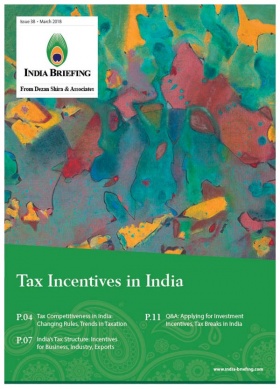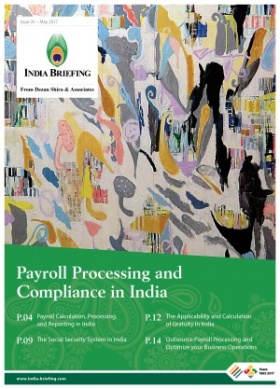Reverse Charge Mechanism in the Import of Services under GST
The new Goods and Services Tax (GST) regime has brought about a slew of reforms to the indirect tax system, which affect firms doing business in India.
One such change pertains to the introduction of reverse charge mechanism (RCM) and the taxation of import of services via RCM.
What is RCM under GST?
Usually, the registered supplier of goods or services is required to pay GST to the government after collecting the same from the recipient.
RCM is a process used in case the supply of goods or services is by an unregistered supplier.
In such transactions, the recipient is required to directly pay GST to the government instead of the unregistered supplier.
It is important to note that in all cases subject to RCM, the recipient must be registered under GST.
What qualifies as import of services under GST?
Import of services under GST has been defined to mean the supply of any service where the supplier is located outside India, the recipient is located in India, and the place of supply of services is in India.
In order to be taxable under GST, the import of services must be for a consideration, irrespective of whether it is used for business purposes.
In case the import of services is made by a taxable person from a related party or from any of his or her establishments outside India in the furtherance of business, it shall be taxable even if such import is made without paying any consideration.
How is total transaction value calculated for import of services under GST?
In transactions involving import of services, the recipient often contractually agrees to compensate the supplier for the income tax payable by him for services rendered in India.
In effect, the recipient ultimately pays the consideration for services as well as the income tax payable by the supplier. In this scenario, the question that arises is whether the tax paid by the recipient on behalf of the supplier forms a part of the total transaction value.
The GST framework specifically clarifies that in such cases, any amount payable by the supplier, but which is incurred by the recipient and not included in the actual consideration for services, will be included while computing the total transaction value.
Therefore, in case of RCM, the recipient has to pay GST on the net transaction value, that is, the consideration amount plus tax paid on behalf of the supplier.
Firms engaged in importing services into India need to be cautious about various overhead compensation clauses in their contracts with service providers as the introduction of GST could significantly increase their tax liability by inflating the transaction value.
Who pays RCM in case of e-commerce service providers?
E-commerce firms providing services through the aggregator model will also have to pay tax via RCM. In such cases, the registered e-commerce operator will be responsible for paying GST to the government instead of service providers such as electricians, carpenters, plumbers, among others.
If the e-commerce operator does not have a physical presence in India, then the operator must appoint a registered representative for the purpose of paying GST.
Impact of RCM on doing business in India
The RCM acts as a self-policing tool under the GST framework and aims to curb tax evasion by motivating firms to register themselves under GST and pay taxes.
Since customers are typically averse to the idea of paying taxes directly to the government and undertaking all the associated paperwork and compliances, they will naturally prefer dealing exclusively with suppliers who are registered under GST.
Hence, unregistered firms are likely to experience decreased revenues as a result of an eroding customer base. This mechanism is designed to ultimately force such unregistered firms to get registered and become GST compliant.
About Us
India Briefing is published by Asia Briefing, a subsidiary of Dezan Shira & Associates. We produce material for foreign investors throughout Eurasia, including ASEAN, China, Indonesia, Russia, the Silk Road, & Vietnam. For editorial matters please contact us here and for a complimentary subscription to our products, please click here.
Dezan Shira & Associates provide business intelligence, due diligence, legal, tax and advisory services throughout India and the Asian region. We maintain offices in Delhi and Mumbai and throughout China, South-East Asia, India, and Russia. For assistance with India investment issues or into Asia overall, please contact us at india@dezshira.com or visit us at www.dezshira.com.
- Previous Article Flexi-Staffing Industry in India: GST Impact, Regulations
- Next Article Anti-Corruption Laws in India: Minimize Your Risk Exposure









